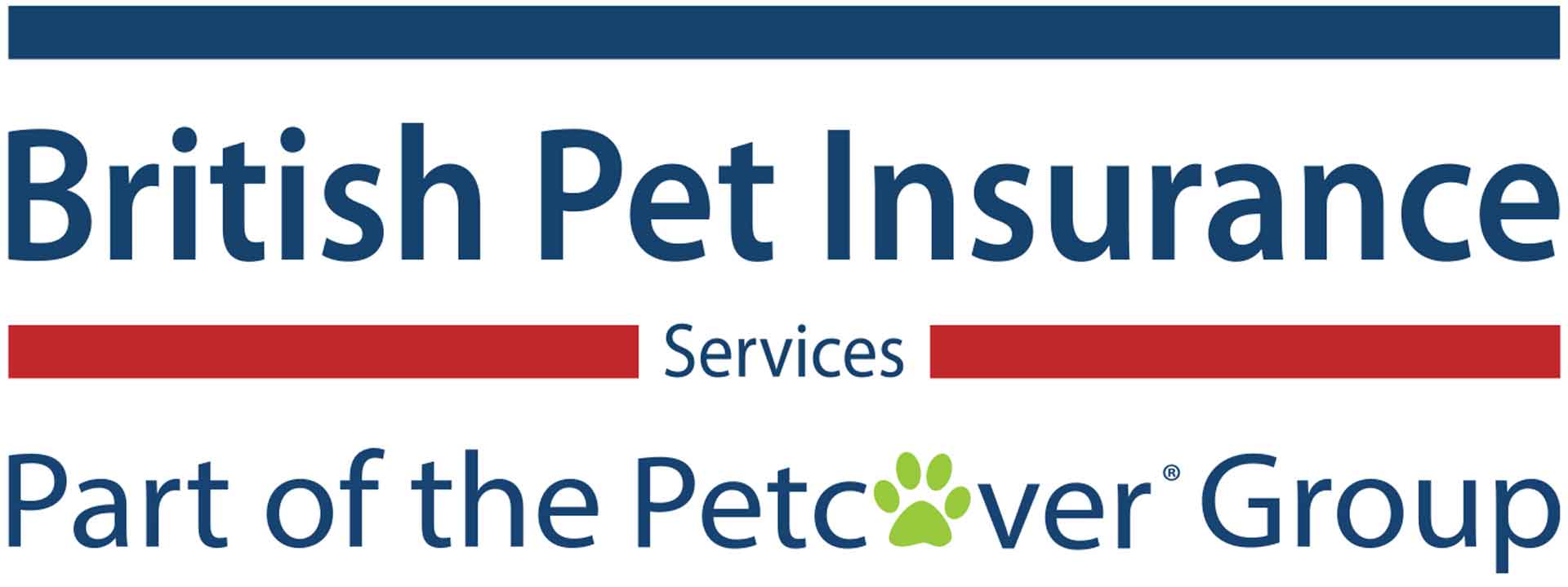Most popular small breed dogs in the UK
21 October 2021
Most popular small breed dogs in the UK
Most popular small breed dogs in the UK
Between Lockdown and working from home, more of us than ever are dog owners in Britain and with so many different breeds out there, it can be hard to know what would suit you best. If you’re thinking of getting your first dog or you live somewhere more urban, a smaller dog could be a better fit but don’t for a second think small means boring. It’s hard to find a small dog that doesn’t come with a huge personality and here’s some of the more popular compact dogs in the UK…
Pug
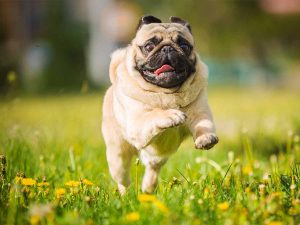
Perhaps one of the most distinctive dogs you can find, there’s no mistaking a pug when you see one but there’s more to this little guy than a cute face.
Pugs are everything you could want in a small dog, friendly, affectionate and great companions with a playful personality. With good socialisation and training, the average pug is a great family pet because they’re so amiable, the get along with kids, other dogs and even the family cat.
Originating from China, the Pug doesn’t usually weigh more than 18lb fully grown and with their short, soft coat, they’re easy to take care of. It is important you make sure any wrinkles are kept clean and dry as they can become a breeding ground for infection and some older pugs, can develop problems around their eyes so it’s important you keep these clean too.
Unfortunately, Pugs can be prone to some health conditions. As they’re a brachycephalic dog, their short snout can lead to breathing difficulties. Dogs with these flat faces will often grow too much soft palate which grows into the back of the throat obstructing their airway. This results in dogs who snort when trying to catch their breath and snore when sleeping. As a result of these breathing difficulties, Pugs are especially susceptible to heatstroke and weight gain.
French bulldog
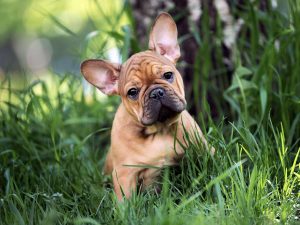
Another dog that routinely tops the most popular dog breed list, the French Bulldog has seen a resurgence in popularity over the past ten years. This handsome little dog has a distinctive flat face and large bat like ears that stand tall on their head when something’s peaked their interest.
Did you know the French Bulldog isn’t actually French but taken over to France by British lace makers in the 1900s. This might be a small dog but their need for attention is anything but. They’re an incredibly playful breed but they’re also very intelligent which means they get bored if not properly trained and challenged. This intelligence can also manifest in a stubborn streak so it’s important you develop a pecking order early on with you at the top otherwise you could find your entire household under the control of this loveable rouge.
If all goes to plan, you’ll be rewarded with a loyal companion who makes a great family dog. Due to their desire to be surrounded by their pack at all times, they don’t like being left alone for long periods of time. Like the pug, Frenchies have a flat face so are also prone to the same health conditions associated with brachycephalic dogs.
English Bulldog
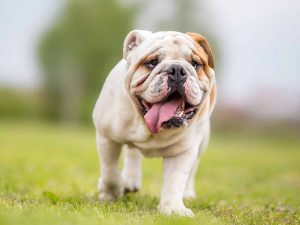
The English Bulldog might look like a dog who means business with their muscular deep chest, thick neck and large chops but they’re actually a very sweet and easy going breed. Many years ago, this affectionate dog’s ancestors were bred for bull baiting and fighting but these days, they don’t have a ferocious bone in their bodies.
Although in our list of popular small breeds, the English Bulldog is certainly at the larger end of this scale. Most larger males will top the scales at 50lbs but not standing higher than 15inches at the shoulder, they’re a very muscly dog and can have a lot of pull when they want to.
Most well-bred, well trained and well socialised Bulldogs are very friendly and will get along with anyone willing to get along with them. They’re not the smartest dog around so it can take a bit of patience when training but once learned, it’s locked away and rarely forgotten. The Bulldog is a popular mascot for schools and colleges (and even the US Marines) because of their reliability and tenacity.
The Bulldog is happy with around 30 minutes exercise a day and typically, an interesting walk will be more than enough. Their flat face means that like the French Bulldog and Pug, they don’t do well in too much heat and can struggle to catch their breath if over exhausted.
Another health condition English Bulldogs can be especially prone to are joint and eye problems and most responsible breeders will be able to prove the puppy’s parents are free from many major hereditary health problems.
Jack Russell
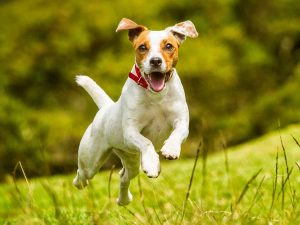
The ever-popular Jack Russell Terrier is the little black dress of the dog world in that it never goes out of style. They might be a small dogs but they have very high energy levels, you’ll get tired of playing fetch long before they do! Originally bred to assist with fox hunting in England, this tenacious terrier was bred to be as quick as the horses and foxes whilst still being attentive to their owners.
Jack Russells are one of the most popular dog breeds when it comes to pet insurance, so be sure to get an insurance quote on your Jack Russell here.
These days, the JRT is a great dog so long as you’re prepared to match the energy levels required. A quick stroll around the park in the morning then being left alone all day won’t cut it with this breed. As well as stamina out on a walk, this dog can leap and dig so you’ll need a garden with a solid fence all the way around and an easy going attitude to your lawn. It’s not surprising that as they were originally a hunting dog, they have a strong prey drive so any visiting squirrel will be quickly seen off.
By most dog standards, the Jack Russell is longer lived than most with many reaching 18yrs. Whilst all dogs can get ill or be prone to accidents, the JRT aren’t especially prone to as many hereditary conditions as some dogs. Due to their high activity levels, they can suffer joint problems later in life but you can mitigate this by making sure they’re not overly exercised when they’re still developing.
Miniature Schnauzers
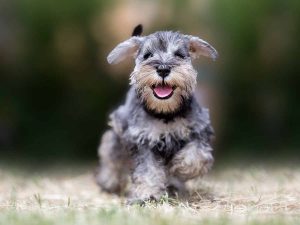
The noble Miniature Schnauzer can trace its lineage back hundreds of years and as well as the miniature version, you can also get standard and giant Schnauzers. The miniature version is a great companion dog and known for its very affable nature, loyalty to their owner and high energy levels.
This breed has a lot of typical terrier tendencies, they need a lot of exercise an activity and don’t cope very well when bored. They’re also very intelligent but like most smart dogs, with great intelligence comes great determination which can come across as stubbornness. They do train well and it’s very important they’re trained and socialised from an early age and they’ll grow into a wonderful family pet. They take their loyalty to their pack very seriously and will always be ready to alert you to any intruders or even a leaf blowing past on the wind! If you’re after a quiet, lazy dog, the Miniature Schnauzer might not be what you’re looking for.
Although they don’t shed too much, the Miniature Schnauzer does require a lot of grooming. They’re a double coated breed which means they have a dense undercoat (which is great at catching lose hairs) and a wiry top coat. Although they’re a low shedding dog, which is why they’re considered an ideal breed for anyone with allergies, they’ll rely on you or an experienced groomer, to keep their coat in tip top condition.
Pomeranians
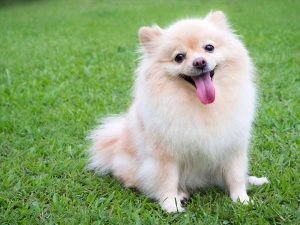
This tiny ball of personality first achieved notoriety after being favoured by Queen Victoria in the late 1800s. You might not think it to look at them, but the Pomeranian was a sled dog and when you give them a second glance, you can see this in their thick, double coat and bushy curled over tail. Subsequent years saw breeders attempt to breed a smaller and smaller version until we have the Pomeranian we see today.
Although the Pom makes a great companion dog and doesn’t need a huge amount of space, they’re not always the most ideal family pet. They offer no acknowledgment of their smaller size so rarely back down if challenged. This means they need very slow and careful introductions to larger dogs and prefer older children who are going to treat them in a calm and respectful manner. Another breed know for their intelligence but this time, their intelligence contributes to their independent nature.
The Pom is better suited to a busy family than many other dogs because of their independent nature. Although they’re not afraid to use their voice, they don’t tend to get as upset if left alone for short periods. It is very important you train and socialise your Pomeranian from a young age though otherwise you’re going to end up being trained by them.
Yorkshire Terriers
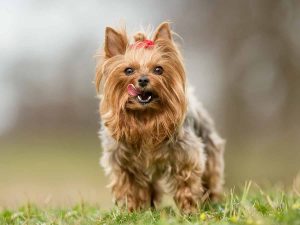
The Yorkshire Terrier, or Yorkie as they’re more affectionately known, has long been one of the most popular toy dog breeds both in the UK and the US. Another big dog personality in the little dog body, this breed can be friendly and adventure seeking.
These little dogs don’t need hours of walks every day, but they do like to keep busy. The terrier in them loves to hunt and play and doesn’t like being left alone for long periods or being ignored. Like the Pomeranian, the Yorkie doesn’t acknowledge their size very readily, so they also need careful, slow introductions to larger dogs and prefer older children. Any excess energy can be channelled into activities like agility which Yorkies often excel at but it’s very important they’re trained and socialised from a young age.
To ensure they’re not easily overlooked in the home, they’ll use their very big voices and are known for being quite vocal.
No matter what breed or mix of breeds you decide to open your home to, it’s important you do your research. Your dog will be completely dependent on you for their health, happiness and wellbeing and most dog owners would agree they get more out of their relationship than they ever thought possible.
Owning a dog can be a fun and rewarding experience
However, if they suffer an illness or injury, it can also be both stressful and expensive. British Pet Insurance Services can provide the support you and your dog need, whether it is with your insurance cover, making a claim or just helpful advice along the way.
Get a quote